Assessment Task 2C: Diabetes Intervention and Health Literacy Report
VerifiedAdded on 2022/11/26
|8
|1774
|286
Report
AI Summary
This report details an evidence-based intervention designed for individuals with type-2 diabetes, focusing on an elderly patient named Lily Green who suffers from multiple chronic disorders, including diabetes and obesity. The intervention centers on improving health literacy and self-management skills through motivational interviewing and patient education. The rationale behind the intervention emphasizes behavioral modification, encouraging lifestyle changes such as increased physical activity and dietary adjustments. The benefits include increased patient willingness to seek help, higher participation rates in treatment programs, and reduced chances of relapse. The report also acknowledges potential risks, such as the intervention's ineffectiveness with resistant patients or those facing strong external negative influences. The conclusion highlights the importance of healthcare professionals motivating patients to adopt healthier lifestyles and develop self-management abilities, ultimately leading to improved health outcomes and a better quality of life for those with type-2 diabetes.
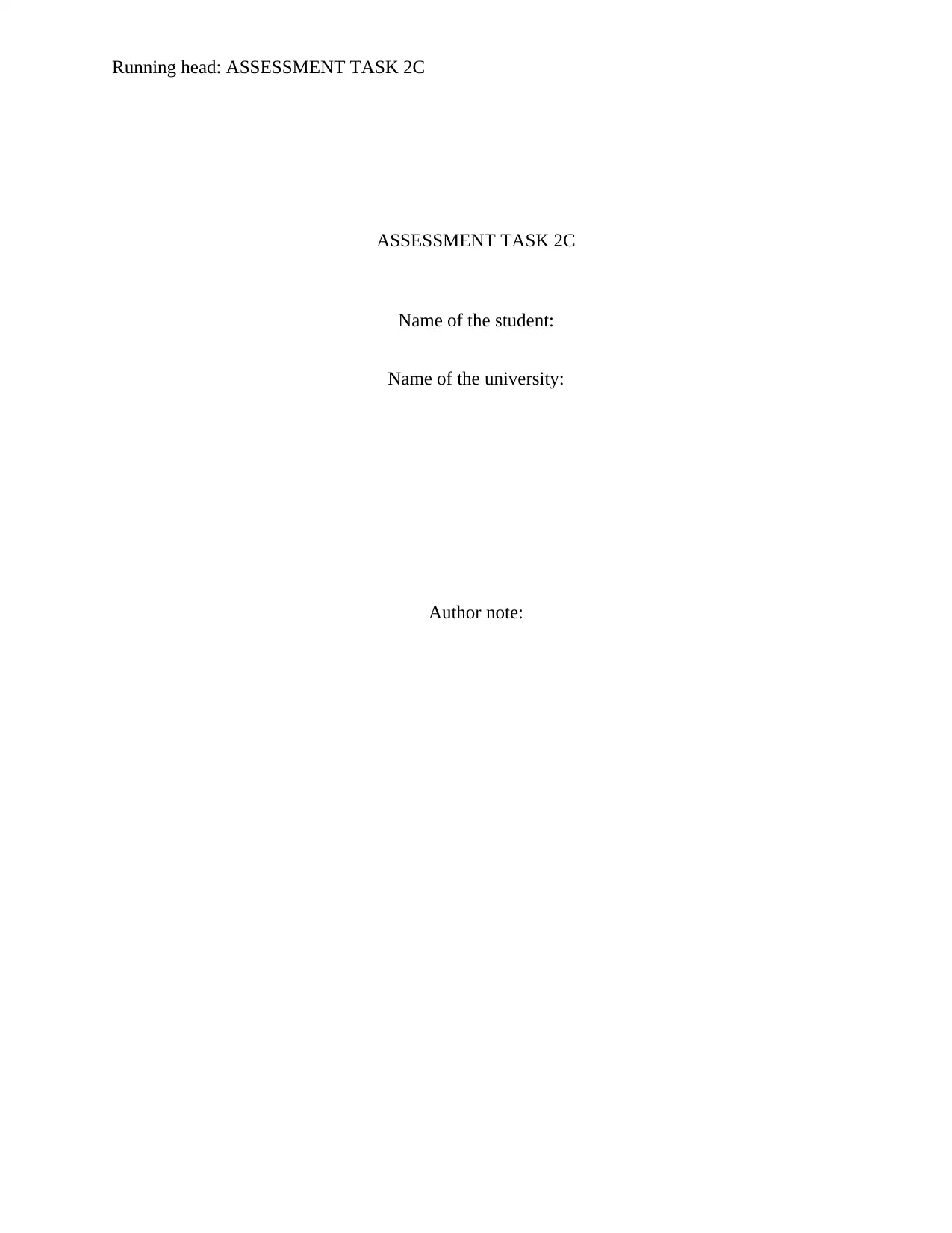
Running head: ASSESSMENT TASK 2C
ASSESSMENT TASK 2C
Name of the student:
Name of the university:
Author note:
ASSESSMENT TASK 2C
Name of the student:
Name of the university:
Author note:
Paraphrase This Document
Need a fresh take? Get an instant paraphrase of this document with our AI Paraphraser
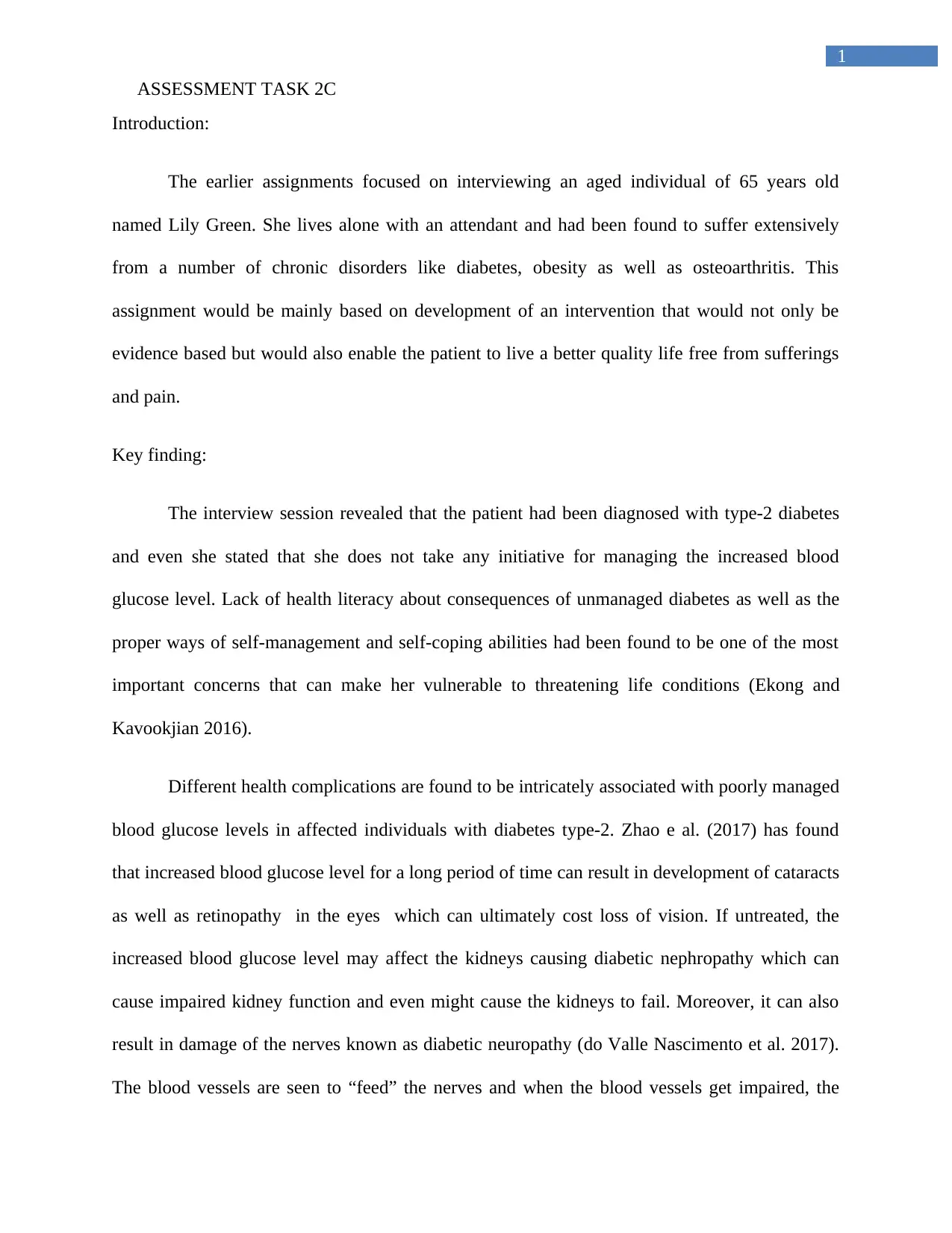
1
ASSESSMENT TASK 2C
Introduction:
The earlier assignments focused on interviewing an aged individual of 65 years old
named Lily Green. She lives alone with an attendant and had been found to suffer extensively
from a number of chronic disorders like diabetes, obesity as well as osteoarthritis. This
assignment would be mainly based on development of an intervention that would not only be
evidence based but would also enable the patient to live a better quality life free from sufferings
and pain.
Key finding:
The interview session revealed that the patient had been diagnosed with type-2 diabetes
and even she stated that she does not take any initiative for managing the increased blood
glucose level. Lack of health literacy about consequences of unmanaged diabetes as well as the
proper ways of self-management and self-coping abilities had been found to be one of the most
important concerns that can make her vulnerable to threatening life conditions (Ekong and
Kavookjian 2016).
Different health complications are found to be intricately associated with poorly managed
blood glucose levels in affected individuals with diabetes type-2. Zhao e al. (2017) has found
that increased blood glucose level for a long period of time can result in development of cataracts
as well as retinopathy in the eyes which can ultimately cost loss of vision. If untreated, the
increased blood glucose level may affect the kidneys causing diabetic nephropathy which can
cause impaired kidney function and even might cause the kidneys to fail. Moreover, it can also
result in damage of the nerves known as diabetic neuropathy (do Valle Nascimento et al. 2017).
The blood vessels are seen to “feed” the nerves and when the blood vessels get impaired, the
ASSESSMENT TASK 2C
Introduction:
The earlier assignments focused on interviewing an aged individual of 65 years old
named Lily Green. She lives alone with an attendant and had been found to suffer extensively
from a number of chronic disorders like diabetes, obesity as well as osteoarthritis. This
assignment would be mainly based on development of an intervention that would not only be
evidence based but would also enable the patient to live a better quality life free from sufferings
and pain.
Key finding:
The interview session revealed that the patient had been diagnosed with type-2 diabetes
and even she stated that she does not take any initiative for managing the increased blood
glucose level. Lack of health literacy about consequences of unmanaged diabetes as well as the
proper ways of self-management and self-coping abilities had been found to be one of the most
important concerns that can make her vulnerable to threatening life conditions (Ekong and
Kavookjian 2016).
Different health complications are found to be intricately associated with poorly managed
blood glucose levels in affected individuals with diabetes type-2. Zhao e al. (2017) has found
that increased blood glucose level for a long period of time can result in development of cataracts
as well as retinopathy in the eyes which can ultimately cost loss of vision. If untreated, the
increased blood glucose level may affect the kidneys causing diabetic nephropathy which can
cause impaired kidney function and even might cause the kidneys to fail. Moreover, it can also
result in damage of the nerves known as diabetic neuropathy (do Valle Nascimento et al. 2017).
The blood vessels are seen to “feed” the nerves and when the blood vessels get impaired, the
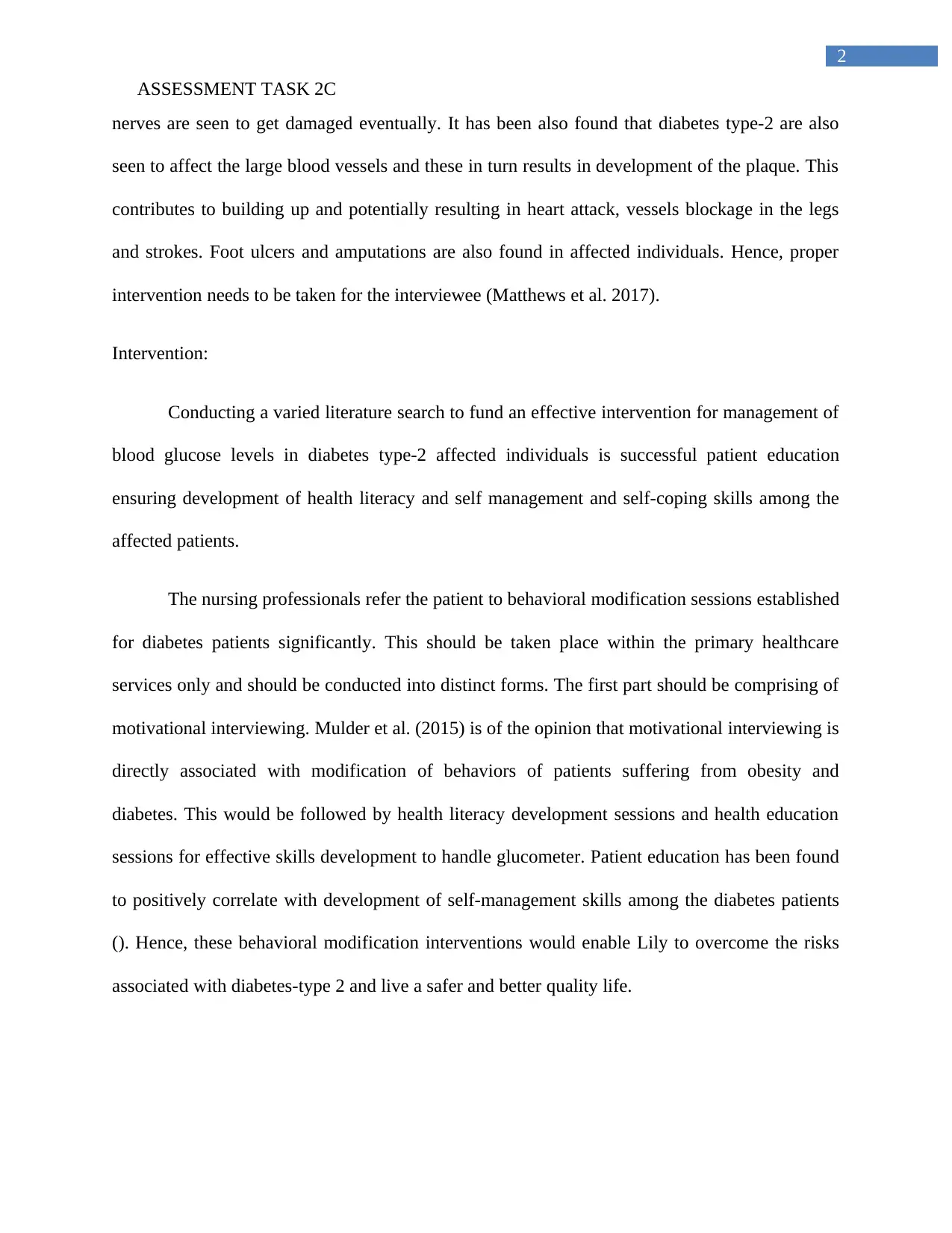
2
ASSESSMENT TASK 2C
nerves are seen to get damaged eventually. It has been also found that diabetes type-2 are also
seen to affect the large blood vessels and these in turn results in development of the plaque. This
contributes to building up and potentially resulting in heart attack, vessels blockage in the legs
and strokes. Foot ulcers and amputations are also found in affected individuals. Hence, proper
intervention needs to be taken for the interviewee (Matthews et al. 2017).
Intervention:
Conducting a varied literature search to fund an effective intervention for management of
blood glucose levels in diabetes type-2 affected individuals is successful patient education
ensuring development of health literacy and self management and self-coping skills among the
affected patients.
The nursing professionals refer the patient to behavioral modification sessions established
for diabetes patients significantly. This should be taken place within the primary healthcare
services only and should be conducted into distinct forms. The first part should be comprising of
motivational interviewing. Mulder et al. (2015) is of the opinion that motivational interviewing is
directly associated with modification of behaviors of patients suffering from obesity and
diabetes. This would be followed by health literacy development sessions and health education
sessions for effective skills development to handle glucometer. Patient education has been found
to positively correlate with development of self-management skills among the diabetes patients
(). Hence, these behavioral modification interventions would enable Lily to overcome the risks
associated with diabetes-type 2 and live a safer and better quality life.
ASSESSMENT TASK 2C
nerves are seen to get damaged eventually. It has been also found that diabetes type-2 are also
seen to affect the large blood vessels and these in turn results in development of the plaque. This
contributes to building up and potentially resulting in heart attack, vessels blockage in the legs
and strokes. Foot ulcers and amputations are also found in affected individuals. Hence, proper
intervention needs to be taken for the interviewee (Matthews et al. 2017).
Intervention:
Conducting a varied literature search to fund an effective intervention for management of
blood glucose levels in diabetes type-2 affected individuals is successful patient education
ensuring development of health literacy and self management and self-coping skills among the
affected patients.
The nursing professionals refer the patient to behavioral modification sessions established
for diabetes patients significantly. This should be taken place within the primary healthcare
services only and should be conducted into distinct forms. The first part should be comprising of
motivational interviewing. Mulder et al. (2015) is of the opinion that motivational interviewing is
directly associated with modification of behaviors of patients suffering from obesity and
diabetes. This would be followed by health literacy development sessions and health education
sessions for effective skills development to handle glucometer. Patient education has been found
to positively correlate with development of self-management skills among the diabetes patients
(). Hence, these behavioral modification interventions would enable Lily to overcome the risks
associated with diabetes-type 2 and live a safer and better quality life.
⊘ This is a preview!⊘
Do you want full access?
Subscribe today to unlock all pages.

Trusted by 1+ million students worldwide
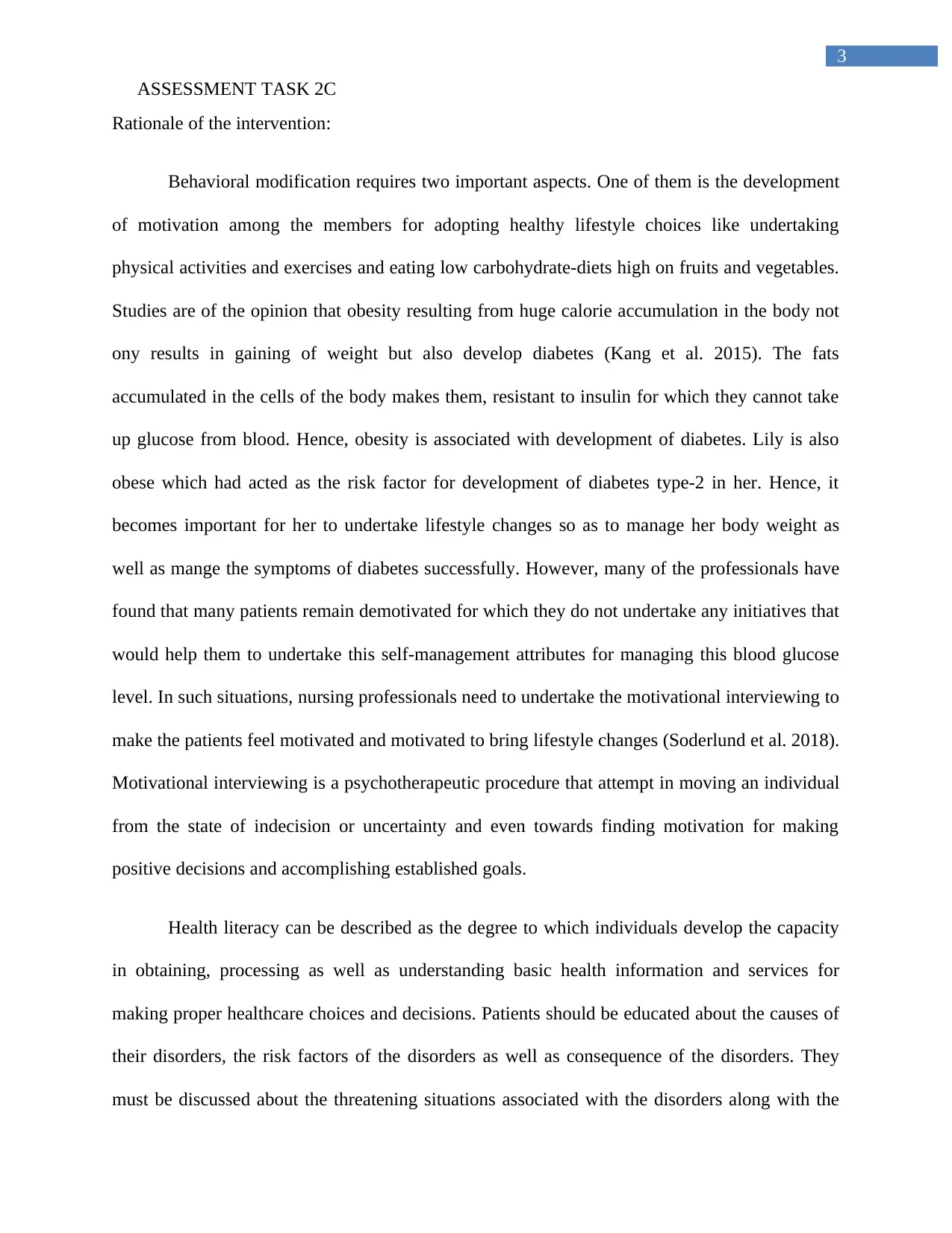
3
ASSESSMENT TASK 2C
Rationale of the intervention:
Behavioral modification requires two important aspects. One of them is the development
of motivation among the members for adopting healthy lifestyle choices like undertaking
physical activities and exercises and eating low carbohydrate-diets high on fruits and vegetables.
Studies are of the opinion that obesity resulting from huge calorie accumulation in the body not
ony results in gaining of weight but also develop diabetes (Kang et al. 2015). The fats
accumulated in the cells of the body makes them, resistant to insulin for which they cannot take
up glucose from blood. Hence, obesity is associated with development of diabetes. Lily is also
obese which had acted as the risk factor for development of diabetes type-2 in her. Hence, it
becomes important for her to undertake lifestyle changes so as to manage her body weight as
well as mange the symptoms of diabetes successfully. However, many of the professionals have
found that many patients remain demotivated for which they do not undertake any initiatives that
would help them to undertake this self-management attributes for managing this blood glucose
level. In such situations, nursing professionals need to undertake the motivational interviewing to
make the patients feel motivated and motivated to bring lifestyle changes (Soderlund et al. 2018).
Motivational interviewing is a psychotherapeutic procedure that attempt in moving an individual
from the state of indecision or uncertainty and even towards finding motivation for making
positive decisions and accomplishing established goals.
Health literacy can be described as the degree to which individuals develop the capacity
in obtaining, processing as well as understanding basic health information and services for
making proper healthcare choices and decisions. Patients should be educated about the causes of
their disorders, the risk factors of the disorders as well as consequence of the disorders. They
must be discussed about the threatening situations associated with the disorders along with the
ASSESSMENT TASK 2C
Rationale of the intervention:
Behavioral modification requires two important aspects. One of them is the development
of motivation among the members for adopting healthy lifestyle choices like undertaking
physical activities and exercises and eating low carbohydrate-diets high on fruits and vegetables.
Studies are of the opinion that obesity resulting from huge calorie accumulation in the body not
ony results in gaining of weight but also develop diabetes (Kang et al. 2015). The fats
accumulated in the cells of the body makes them, resistant to insulin for which they cannot take
up glucose from blood. Hence, obesity is associated with development of diabetes. Lily is also
obese which had acted as the risk factor for development of diabetes type-2 in her. Hence, it
becomes important for her to undertake lifestyle changes so as to manage her body weight as
well as mange the symptoms of diabetes successfully. However, many of the professionals have
found that many patients remain demotivated for which they do not undertake any initiatives that
would help them to undertake this self-management attributes for managing this blood glucose
level. In such situations, nursing professionals need to undertake the motivational interviewing to
make the patients feel motivated and motivated to bring lifestyle changes (Soderlund et al. 2018).
Motivational interviewing is a psychotherapeutic procedure that attempt in moving an individual
from the state of indecision or uncertainty and even towards finding motivation for making
positive decisions and accomplishing established goals.
Health literacy can be described as the degree to which individuals develop the capacity
in obtaining, processing as well as understanding basic health information and services for
making proper healthcare choices and decisions. Patients should be educated about the causes of
their disorders, the risk factors of the disorders as well as consequence of the disorders. They
must be discussed about the threatening situations associated with the disorders along with the
Paraphrase This Document
Need a fresh take? Get an instant paraphrase of this document with our AI Paraphraser
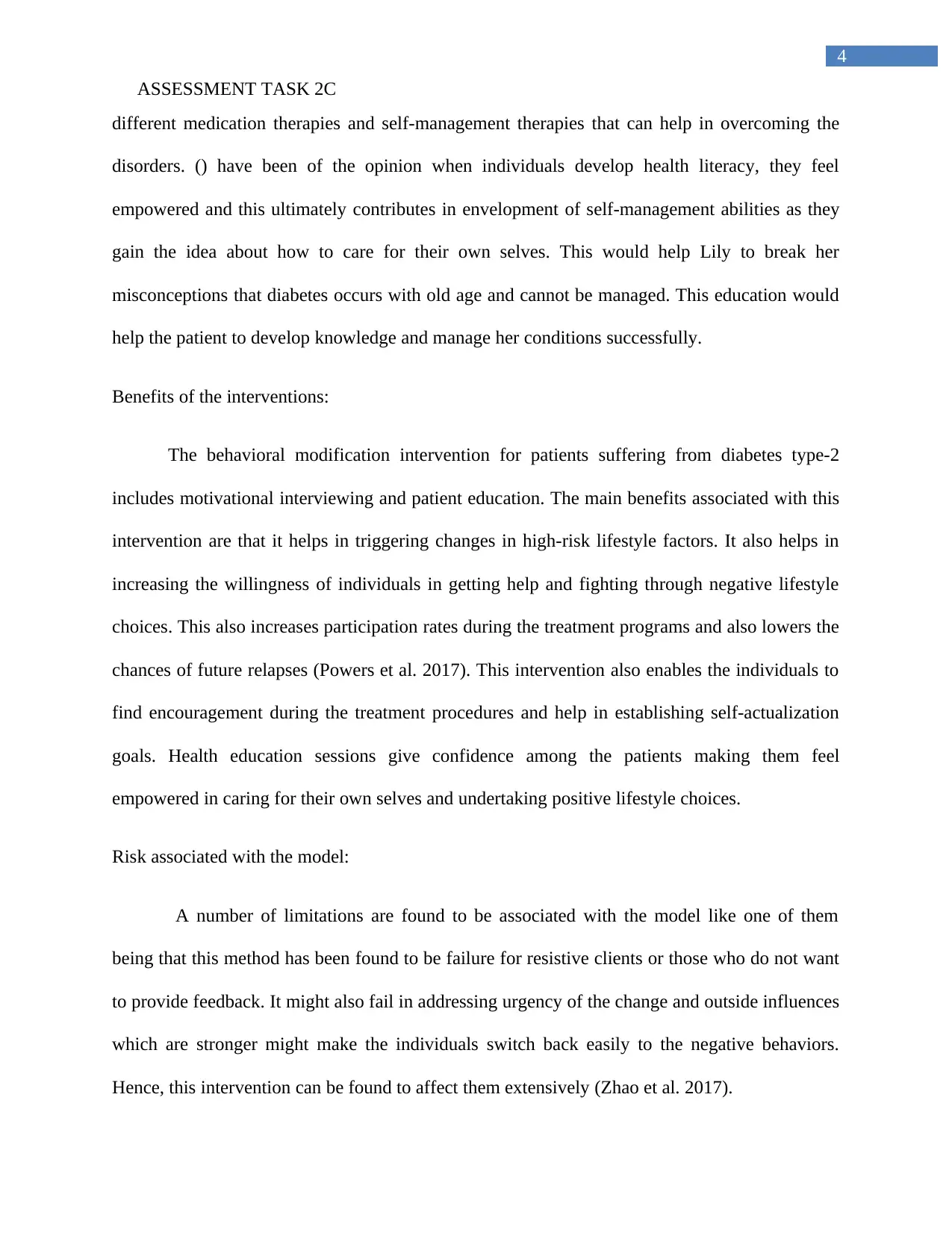
4
ASSESSMENT TASK 2C
different medication therapies and self-management therapies that can help in overcoming the
disorders. () have been of the opinion when individuals develop health literacy, they feel
empowered and this ultimately contributes in envelopment of self-management abilities as they
gain the idea about how to care for their own selves. This would help Lily to break her
misconceptions that diabetes occurs with old age and cannot be managed. This education would
help the patient to develop knowledge and manage her conditions successfully.
Benefits of the interventions:
The behavioral modification intervention for patients suffering from diabetes type-2
includes motivational interviewing and patient education. The main benefits associated with this
intervention are that it helps in triggering changes in high-risk lifestyle factors. It also helps in
increasing the willingness of individuals in getting help and fighting through negative lifestyle
choices. This also increases participation rates during the treatment programs and also lowers the
chances of future relapses (Powers et al. 2017). This intervention also enables the individuals to
find encouragement during the treatment procedures and help in establishing self-actualization
goals. Health education sessions give confidence among the patients making them feel
empowered in caring for their own selves and undertaking positive lifestyle choices.
Risk associated with the model:
A number of limitations are found to be associated with the model like one of them
being that this method has been found to be failure for resistive clients or those who do not want
to provide feedback. It might also fail in addressing urgency of the change and outside influences
which are stronger might make the individuals switch back easily to the negative behaviors.
Hence, this intervention can be found to affect them extensively (Zhao et al. 2017).
ASSESSMENT TASK 2C
different medication therapies and self-management therapies that can help in overcoming the
disorders. () have been of the opinion when individuals develop health literacy, they feel
empowered and this ultimately contributes in envelopment of self-management abilities as they
gain the idea about how to care for their own selves. This would help Lily to break her
misconceptions that diabetes occurs with old age and cannot be managed. This education would
help the patient to develop knowledge and manage her conditions successfully.
Benefits of the interventions:
The behavioral modification intervention for patients suffering from diabetes type-2
includes motivational interviewing and patient education. The main benefits associated with this
intervention are that it helps in triggering changes in high-risk lifestyle factors. It also helps in
increasing the willingness of individuals in getting help and fighting through negative lifestyle
choices. This also increases participation rates during the treatment programs and also lowers the
chances of future relapses (Powers et al. 2017). This intervention also enables the individuals to
find encouragement during the treatment procedures and help in establishing self-actualization
goals. Health education sessions give confidence among the patients making them feel
empowered in caring for their own selves and undertaking positive lifestyle choices.
Risk associated with the model:
A number of limitations are found to be associated with the model like one of them
being that this method has been found to be failure for resistive clients or those who do not want
to provide feedback. It might also fail in addressing urgency of the change and outside influences
which are stronger might make the individuals switch back easily to the negative behaviors.
Hence, this intervention can be found to affect them extensively (Zhao et al. 2017).
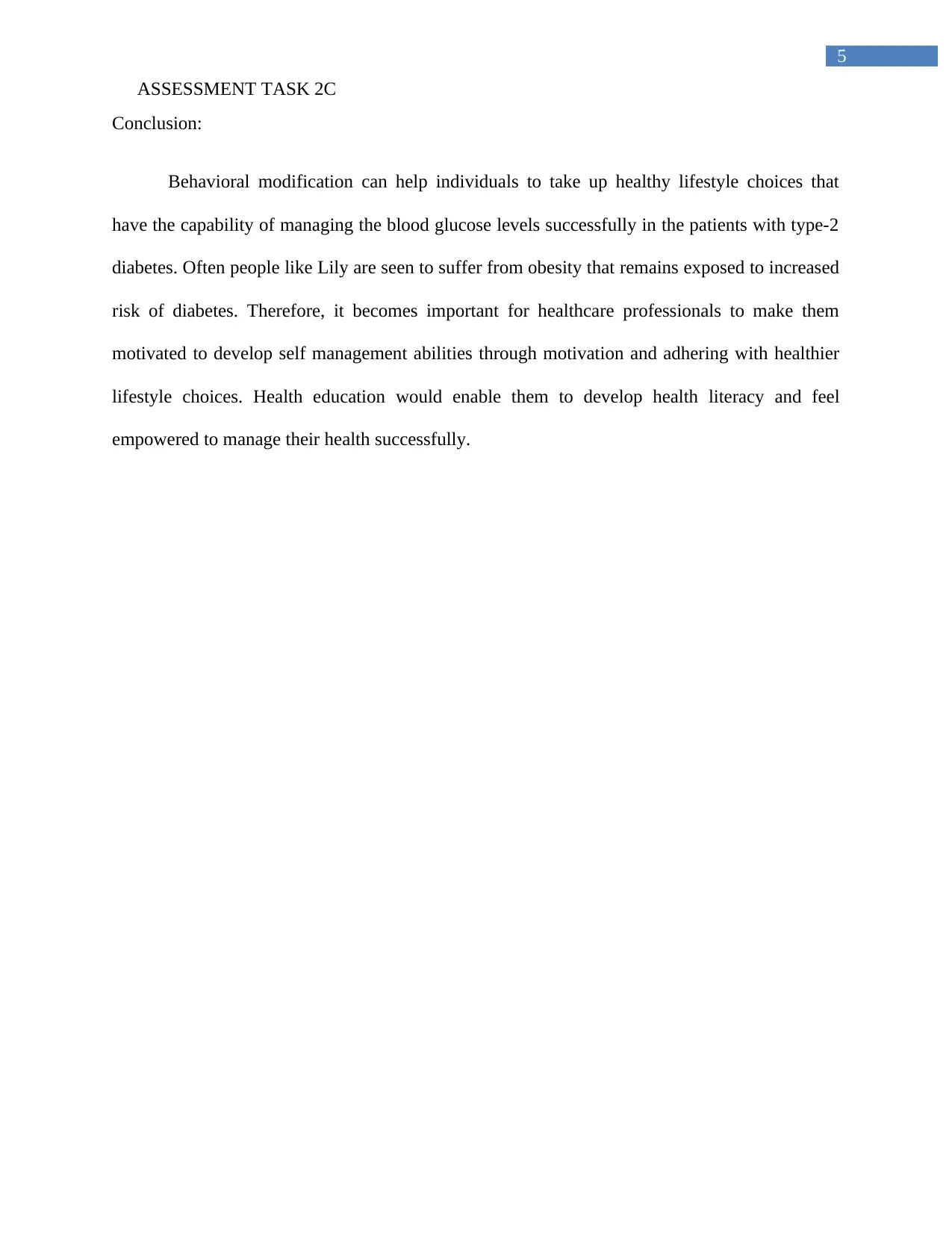
5
ASSESSMENT TASK 2C
Conclusion:
Behavioral modification can help individuals to take up healthy lifestyle choices that
have the capability of managing the blood glucose levels successfully in the patients with type-2
diabetes. Often people like Lily are seen to suffer from obesity that remains exposed to increased
risk of diabetes. Therefore, it becomes important for healthcare professionals to make them
motivated to develop self management abilities through motivation and adhering with healthier
lifestyle choices. Health education would enable them to develop health literacy and feel
empowered to manage their health successfully.
ASSESSMENT TASK 2C
Conclusion:
Behavioral modification can help individuals to take up healthy lifestyle choices that
have the capability of managing the blood glucose levels successfully in the patients with type-2
diabetes. Often people like Lily are seen to suffer from obesity that remains exposed to increased
risk of diabetes. Therefore, it becomes important for healthcare professionals to make them
motivated to develop self management abilities through motivation and adhering with healthier
lifestyle choices. Health education would enable them to develop health literacy and feel
empowered to manage their health successfully.
⊘ This is a preview!⊘
Do you want full access?
Subscribe today to unlock all pages.

Trusted by 1+ million students worldwide
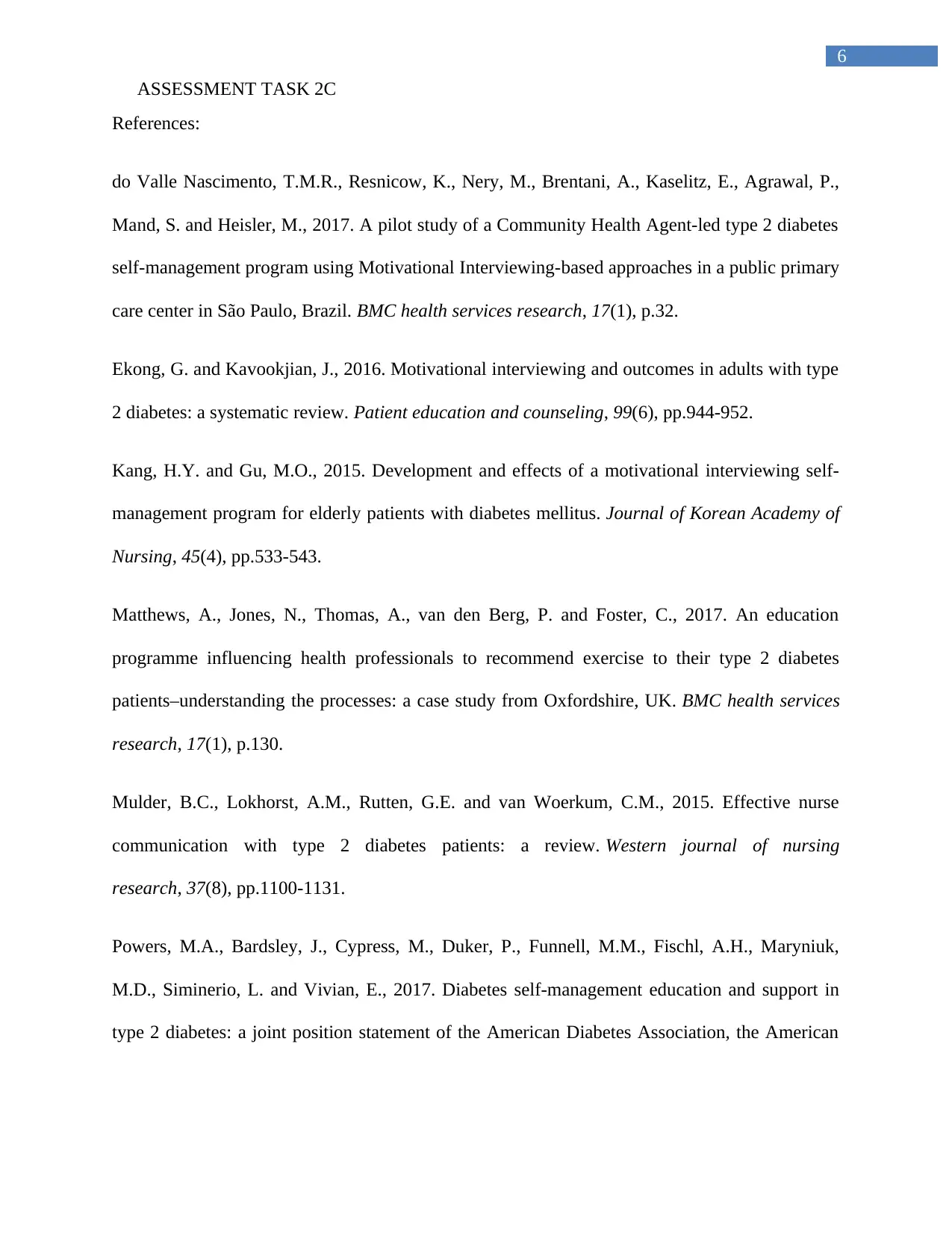
6
ASSESSMENT TASK 2C
References:
do Valle Nascimento, T.M.R., Resnicow, K., Nery, M., Brentani, A., Kaselitz, E., Agrawal, P.,
Mand, S. and Heisler, M., 2017. A pilot study of a Community Health Agent-led type 2 diabetes
self-management program using Motivational Interviewing-based approaches in a public primary
care center in São Paulo, Brazil. BMC health services research, 17(1), p.32.
Ekong, G. and Kavookjian, J., 2016. Motivational interviewing and outcomes in adults with type
2 diabetes: a systematic review. Patient education and counseling, 99(6), pp.944-952.
Kang, H.Y. and Gu, M.O., 2015. Development and effects of a motivational interviewing self-
management program for elderly patients with diabetes mellitus. Journal of Korean Academy of
Nursing, 45(4), pp.533-543.
Matthews, A., Jones, N., Thomas, A., van den Berg, P. and Foster, C., 2017. An education
programme influencing health professionals to recommend exercise to their type 2 diabetes
patients–understanding the processes: a case study from Oxfordshire, UK. BMC health services
research, 17(1), p.130.
Mulder, B.C., Lokhorst, A.M., Rutten, G.E. and van Woerkum, C.M., 2015. Effective nurse
communication with type 2 diabetes patients: a review. Western journal of nursing
research, 37(8), pp.1100-1131.
Powers, M.A., Bardsley, J., Cypress, M., Duker, P., Funnell, M.M., Fischl, A.H., Maryniuk,
M.D., Siminerio, L. and Vivian, E., 2017. Diabetes self-management education and support in
type 2 diabetes: a joint position statement of the American Diabetes Association, the American
ASSESSMENT TASK 2C
References:
do Valle Nascimento, T.M.R., Resnicow, K., Nery, M., Brentani, A., Kaselitz, E., Agrawal, P.,
Mand, S. and Heisler, M., 2017. A pilot study of a Community Health Agent-led type 2 diabetes
self-management program using Motivational Interviewing-based approaches in a public primary
care center in São Paulo, Brazil. BMC health services research, 17(1), p.32.
Ekong, G. and Kavookjian, J., 2016. Motivational interviewing and outcomes in adults with type
2 diabetes: a systematic review. Patient education and counseling, 99(6), pp.944-952.
Kang, H.Y. and Gu, M.O., 2015. Development and effects of a motivational interviewing self-
management program for elderly patients with diabetes mellitus. Journal of Korean Academy of
Nursing, 45(4), pp.533-543.
Matthews, A., Jones, N., Thomas, A., van den Berg, P. and Foster, C., 2017. An education
programme influencing health professionals to recommend exercise to their type 2 diabetes
patients–understanding the processes: a case study from Oxfordshire, UK. BMC health services
research, 17(1), p.130.
Mulder, B.C., Lokhorst, A.M., Rutten, G.E. and van Woerkum, C.M., 2015. Effective nurse
communication with type 2 diabetes patients: a review. Western journal of nursing
research, 37(8), pp.1100-1131.
Powers, M.A., Bardsley, J., Cypress, M., Duker, P., Funnell, M.M., Fischl, A.H., Maryniuk,
M.D., Siminerio, L. and Vivian, E., 2017. Diabetes self-management education and support in
type 2 diabetes: a joint position statement of the American Diabetes Association, the American
Paraphrase This Document
Need a fresh take? Get an instant paraphrase of this document with our AI Paraphraser
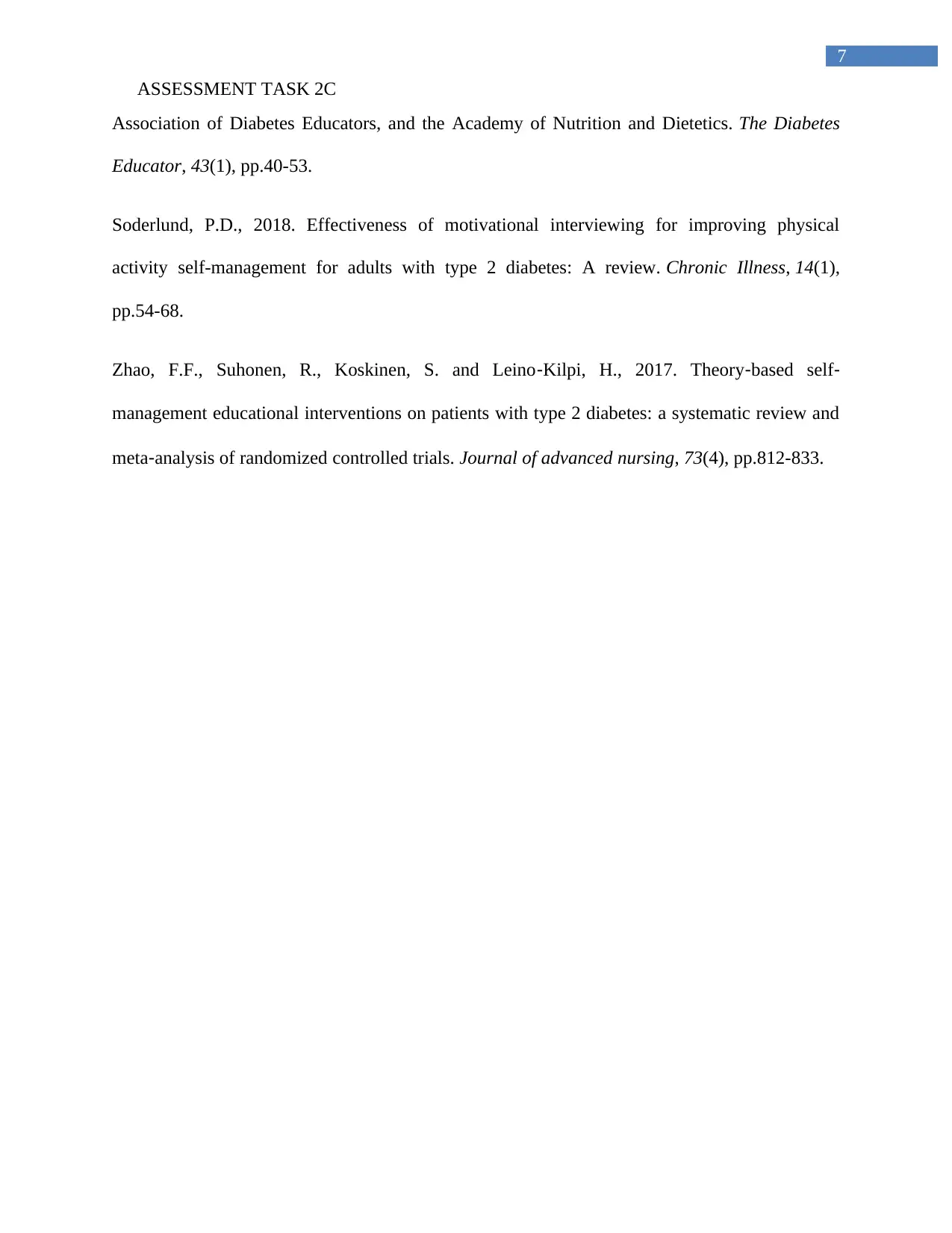
7
ASSESSMENT TASK 2C
Association of Diabetes Educators, and the Academy of Nutrition and Dietetics. The Diabetes
Educator, 43(1), pp.40-53.
Soderlund, P.D., 2018. Effectiveness of motivational interviewing for improving physical
activity self-management for adults with type 2 diabetes: A review. Chronic Illness, 14(1),
pp.54-68.
Zhao, F.F., Suhonen, R., Koskinen, S. and Leino‐Kilpi, H., 2017. Theory‐based self‐
management educational interventions on patients with type 2 diabetes: a systematic review and
meta‐analysis of randomized controlled trials. Journal of advanced nursing, 73(4), pp.812-833.
ASSESSMENT TASK 2C
Association of Diabetes Educators, and the Academy of Nutrition and Dietetics. The Diabetes
Educator, 43(1), pp.40-53.
Soderlund, P.D., 2018. Effectiveness of motivational interviewing for improving physical
activity self-management for adults with type 2 diabetes: A review. Chronic Illness, 14(1),
pp.54-68.
Zhao, F.F., Suhonen, R., Koskinen, S. and Leino‐Kilpi, H., 2017. Theory‐based self‐
management educational interventions on patients with type 2 diabetes: a systematic review and
meta‐analysis of randomized controlled trials. Journal of advanced nursing, 73(4), pp.812-833.
1 out of 8
Related Documents
Your All-in-One AI-Powered Toolkit for Academic Success.
+13062052269
info@desklib.com
Available 24*7 on WhatsApp / Email
![[object Object]](/_next/static/media/star-bottom.7253800d.svg)
Unlock your academic potential
Copyright © 2020–2026 A2Z Services. All Rights Reserved. Developed and managed by ZUCOL.





